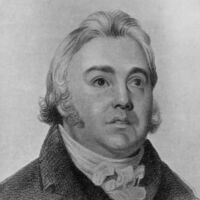To a Young Lady, With a Poem on the French Revolution
Much on my early youth I love to dwell,
Ere yet I bade that friendly dome farewell,
Where first, beneath the echoing cloisters, pale,
I heard of guilt and wondered at the tale!
Yet tho’ the hours flew by on careless wing,
Full heavily of sorrow would I sing.
Aye as the star of evening flung its beam
In broken radiance on the wavy stream,
My soul amid the pensive twilight gloom
Mourned with the breeze, O, Lee Boo! o’er thy tomb.
Where’er I wanderd, pity still was near,
Breathed from the heart and glistened in the tear:
No knell that tolled, but filled my anxious eye,
And suffering nature wept that one should die!
Thus to sad sympathies I soothed my breast,
Calm, as the rainbow in the weeping west:
When slumb’ring freedom roused by high disdain
With giant fury burst her triple chain!
Fierce on her front the blasting dog-star glowed;
Her banners like a midnight meteor flowed;
Amid the yelling of the storm-rent skies
She came, and scattered battles from her eyes!
Then exultation waked the patriot fire
And swept with wilder hand the Alcaean lyre:
Red from the tyrant’s wound I shook the lance,
And strode in joy the reeking plains of France!
Fall’n is th’ oppressor, friendless, ghastly, low,
And my heart aches tho’ mercy struck the blow.
With wearied thought once more I see the shade,
Where peaceful virtue weaves the myrtle braid.
And O! if eyes, whose holy glances roll,
Swift messengers, and eloquent of soul;
If smiles more winning, and a gentler mien,
Than the love-wildered maniac’s brain hath seen
Shaping celestial forms in vacant air,
If these demand th’ impassioned poet’s care—
If mirth, and softened sense, and wit refined,
The blameless features of a lovely mind;
Then haply shall my trembling hand assign
No fading wreath beauty’s saintly shrine.
Nor, Sara! thou these early flowers refuse——
Ne’er lurked the snake beneath their simple hues,
No purple bloom the child of nature brings
From flatt’ry’s night-shade: as he feels, he sings.
Sept. 1794.

